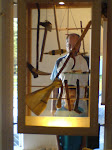The dreadful children are a problem. The clever ones are on the contrary no problems. And maybe that’s their problem? But maybe one shall not make something a problem that in fact seems to function. What isn’t more natural than to think that that they who have succeeded, has talent and are praised for their achievements doesn’t have a strong and stable self-esteem? But often it isn’t like that.
Many of these clever children can need consideration and being mentioned. Think of all those children sitting in the cars back-seat when the family is on a trip, telling fun stories, singing songs to sheer all up. Children whose capacities and abilities of caring makes the others feel unconcerned, everything is ok.
Even if they are sick they don’t get fever. They go to school as usual despite their sickness. Asthma, yes, even diabetes – but see how great they are handling it! They are so clever.
They are polite, have nice traits of character and even better report cards. From where do they get their power and ability?
They are in a constant preparedness for doing things/something.
The alternative – not achieving or producing doesn’t exists? (but it doesn't mean that these children take a lot of place and are seen, or want to be seen).
An honourable behavior can be an expression for weak psychological boundaries. The bad brother of care is the lacking care about oneself.
A child has a need for care and it uses its possibilities, just like the plant which turn to the sun for its survival. One way out, handling this lack, is the defensive. A very concrete example of this is anorexia. A person which tries to live on the fact that she doesn’t need anything.
Another path is the compensatory. The child tries to get acknowledgment by trying to reach the norm and our common ideals. The normality becomes the rule into which the child can enter and get security. It gets so melted together with this role so you can hardly see the masked self-knowledge.
These children easily become super adapting!! They can develop their ability as caretakers into perfection. Become mothers to their mothers (and fathers??).
The clever child’s dilemma contains not knowing. The negative emotions are there, but there is no apparent, acknowledgeable history to explain the presence of these emotions with. She/he can have friends with acknowledged traumas; children who have grown up with violence, alcoholism and abuse. The clever child’s story is more about a psychological absence than the presence of something traumatic (the traumatic things are hidden, because the parents had these means???).
The cleverness is no solution to the problem. This sort of (bad) "solution" can strengthen the problem through undermining the ability to expect and receive care. These children are so lonely because the cleverness and the independency camouflage the need of being little. Their cleverness is a way to acknowledgment, but also a way of sabotaging for themselves. It is a way to tell the world that you are self-supported, which one of course isn’t.
Worries from a depressed, anxious and scared mother can be confusingly like love, but it isn’t the same. Worries are the saboteur of love. Worries can look like care… There are explanations to the mother’s problems, maybe even very apparent (but not always, because they can be hidden and denied too), but how does that help her son/daughter? It doesn’t.
The clever child can have learnt very early important and unconscious lessons to adjust his/her expectations on what he/she got in form of care. Maybe the small child was forced into an early form of sense/feeling, which said that in some emotional situations he/she had to be self going (not needing, not problematic etc.).
As grown up he isn’t especially good at utilizing him/herself of the love he/she gets, simply because he/she can’t. She/he could and still can manage without anyone. Very honourable!! (???) Simply because he/she could (can get to hear as grown up "You don't need..."). Noone can hear the suffering that is so well hidden that the child doesn’t (seem) to miss anything, not even the child him/herself can hear it. He/she is a closed circulation, a self-referring system.
But the day the "missedness" comes…? When he/she feels something is lacking…
This inspired by a blogpost here.
Very tired after a day out at a tarn just outside the town with the staff from my work-place. Where we had a barbecue (grilling sausages, meat, fish for lunch) and played (competed with games) from lunch and after... A couple of people took a bath too. It has been a very warm summers day. I would like to scream?? Headache. But I wrote nevertheless.
All children starts school tomorrow.
English word of today "tarn" which means "tjärn" in Swedish.





























Inga kommentarer:
Skicka en kommentar